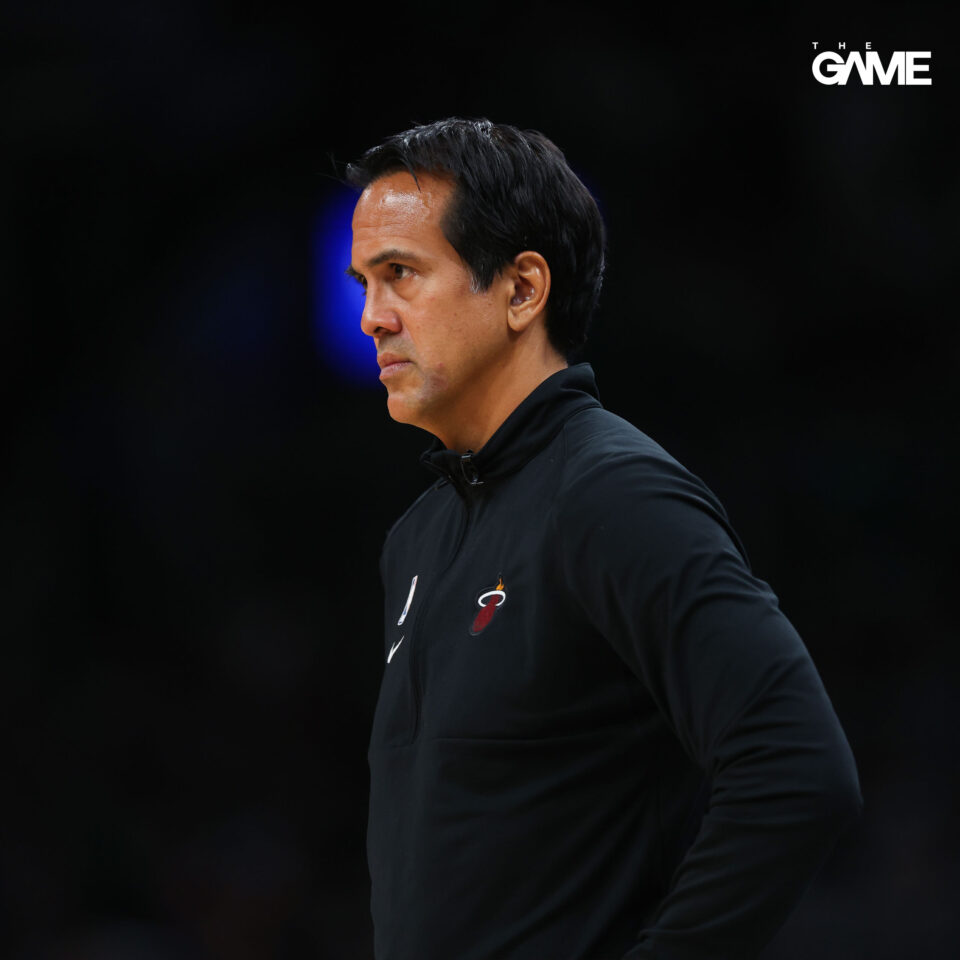The GAME traces back to Erik Spoelstra’s Filipino-American roots and discovers how his unique background led him on a path to become one of the most revered coaches in all of basketball and a role model to millions.
Erik Spoelstra stands courtside with his hands on his hips, eyes sharply focused, watching intently as the players on the court run their drills. We’ve seen this image of him before. Any fan of the NBA can easily conjure it up from memory without much effort, given how often the Miami Heat head coach has led his team to the NBA Playoffs, let alone the Finals. His power stance is a familiar sight. Except, one thing is different. As he makes his presence felt by doing nothing more than keeping his eyes on the players taking turns attempting lay-ups — sometimes missing — he has a smile on his face, from ear to ear.
Spoelstra is not on the court at Kaseya Center. He’s in Kerry Arena in Manila, Philippines hosting an elite basketball clinic for young Filipino players.
Coaching kids and going back to the grassroots of the sport is something he finds “relaxing“; a break from the stress that comes with being the head coach of the Miami Heat. Spoelstra enjoys spending his time this way so much that he’s spent consecutive summers in the Philippines in the past, traveling from city to city, hosting clinics for the kids born into this basketball-crazy nation. Some of the players he trained from some ten years ago are now coaches themselves.
It explains the smile on his face.
In between their drills, Spoelstra, whom the players refer to as ‘Coach Spo,’ comes up to a few of the players. Pointing to one of them, he asks the group, “This is the best shooter?” The girls around her nod. Coach puts two fingers up to his eyes and playfully says, “I’m watching,” before walking away. The players laugh and snicker and tease each other, thrilled at the attention. After all, for two hours on a Tuesday morning, they get to learn from (and even joke around with) a proven NBA head coach. How many other high school and college kids can say that they’ve had the same experience? I was starstruck myself simply standing on the sidelines.
And yet, even in my amazement, I felt a sense of familiarity as I watched Erik Spoelstra giving pointers to these young players. There is something that makes him feel not so far away; something that could, even for just a second, make me forget that he’s actually won two NBA championships as the Heat’s head coach and that he’s worked with iconic names like LeBron James, Dwyane Wade, and Chris Bosh.
I later realized what it was. It’s the Filipino in him.
Family values
Erik Spoelstra is not in the Philippines just to conduct a training camp for Filipino basketball players. He’s here on official business, as an assistant coach of Team USA for the 2023 FIBA World Cup. And even though staying in Bonifacio Global City (BGC) makes him feel at home — it reminds him of Brickell, a neighborhood in Miami — the Philippines is not exactly “home” to Coach Spo, as he is American, born and raised.
Spoelstra was born in the United States to an American father and a Filipino mother. “It was a unique background,” Spoelstra told me. “I’m very proud to be an American but I’m also very proud of my Filipino heritage.”
His parents raised him and his sister, Monica, in Portland, Oregon. With a Filipino mother in the house who grew up in Laguna, Philippines, Erik shared that he had a very value-centered upbringing. “Even living in Oregon, I really feel like there were a lot of Filipino values.
“My mother really worked to keep me grounded on the things that really matter.”
With this, one of the most important things that Spoelstra learned from a young age, which would go on to shape his entire career, was to put family first. Even now, at 52 years old, he tells us that while he’s in the Philippines, coaching a young roster of NBA players, he plans to make time for family, as he always does on his trips to the country. With family at the heart of his upbringing, this brought forth many other foundational values he still holds close to this day, among which he highlights sacrifice, service, and humility. He would later find these vital to his success.
As a student at Jesuit High School in Beaverton, Erik looked up to former NBA player Terry Porter and wore the number 30 on his varsity jersey. He later attended the University of Portland where he was named the West Coast Rookie of the Year and became a member of the school’s 1,000-point club.
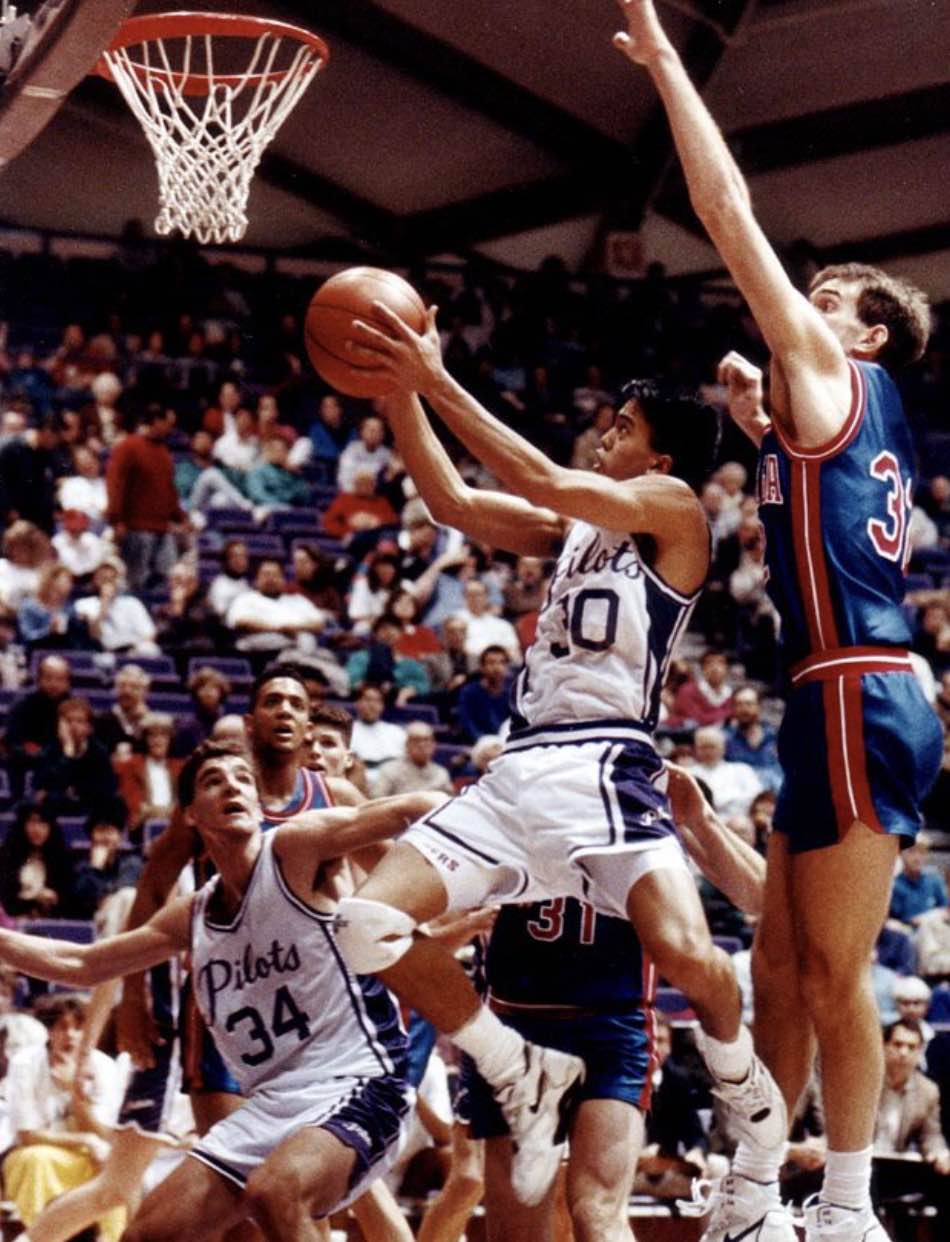
Although he was raised with Filipino values many of us can relate to, as a first-generation Filipino-American, Spoelstra’s background as an athlete sings the same tune as many other American basketball players. But growing up, his dream was a little bit different. He wanted to play for the Philippine Basketball Association (PBA), the biggest league in his mother’s home country. So while other players his age were probably dreaming of making it to the NBA one day, a young Spoelstra would sit in his house in Oregon and watch PBA games on VHS tapes sent to him by his family members living in the Philippines.
“Growing up, my goal initially was to play in the PBA,” Spoelstra said. “I just saw how crazy the crowds were, and I thought, I want to do that. And that was always part of my plan. I ended up playing overseas for a couple of years and I was going to eventually come over here and try to play.”
After he graduated from the University of Portland, the Filipino-American competed in the second division of the Basketball Bundesliga in Germany as a player and an assistant coach for TuS Herten. And as his career in Europe was about to end, Spoelstra had an opportunity to play in the Philippines.
Legendary Philippine basketball coach Tim Cone, with the help of NBA scout Jim Kelly, recognized Spoelstra early on and wanted to draft him in his first few years as a coach for Alaska. However, he was competing against another tempting offer: the Miami Heat was offering Spoelstra the opportunity to work for their team as a video coordinator.
Erik Spoelstra spent years dreaming of playing in the PBA, drawn by the cheering crowds that he used to see on his VHS tapes. He could have been praised, revered, and adored as a star player in Manila — Filipinos treat basketball players like celebrities — and the opportunity to turn this dream into reality stood right before him.
But, he didn’t just grow up with a dream. He also grew up learning humility, knowing sacrifice, and the value of hard work. Here, he had a chance to work for an NBA team, albeit, starting from the bottom of the barrel. So this is how he ended up as the video coordinator for the Miami Heat, spending all-nighters editing videos in a windowless storage room that the team referred to as ‘The Dungeon,’ with no guarantee of where this entry-level position would bring his career.
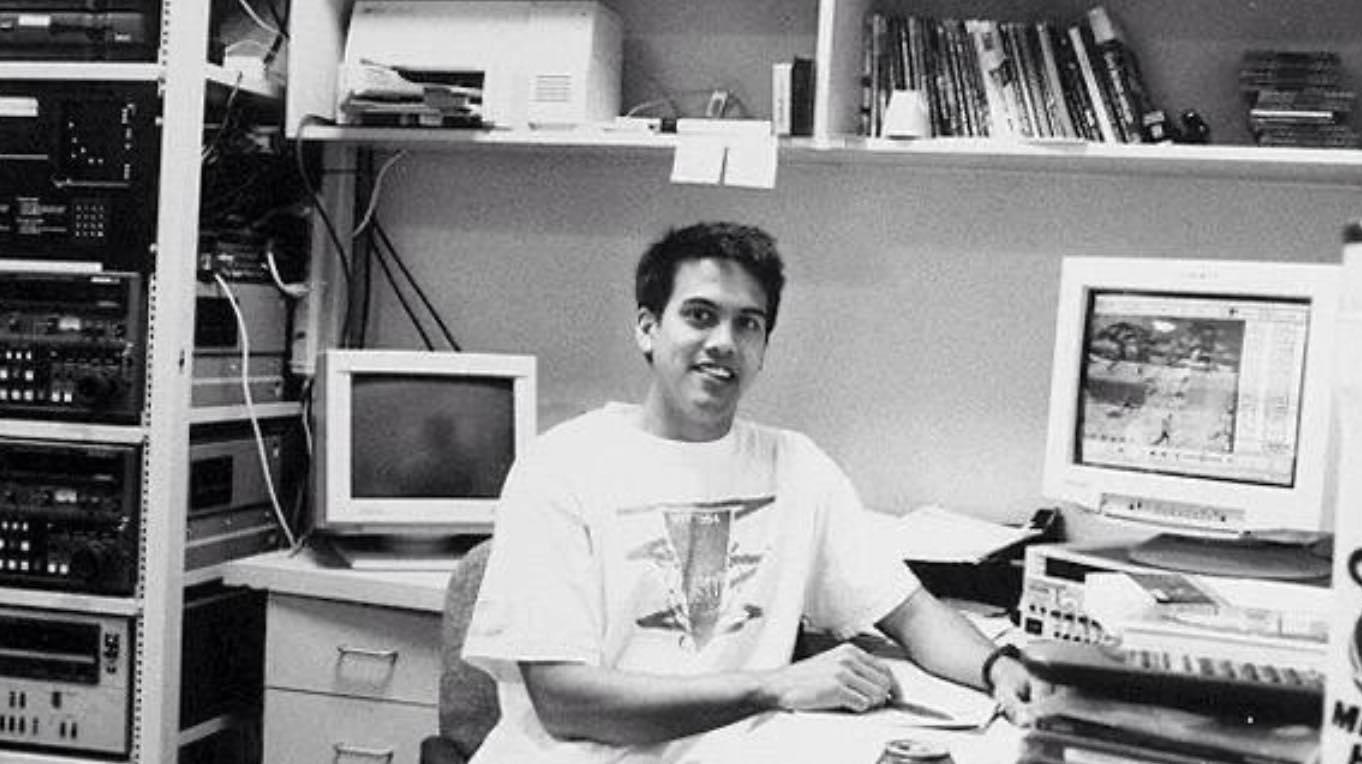
First Filipino-American head coach
Once the young Filipino players in Kerry Arena were finished with their drills, they gathered together. Sitting on the hardwood floor in a half-circle, eyes aglow with excitement, they looked up to Erik Spoelstra who was sitting on a chair facing them, ready to answer the players’ burning questions.
Still with a smile on his face, Coach Spo flipped through the pages of his memory to impart some wisdom to the young dreamers before him. Reflecting on his career in response to one of their questions, he raises his right hand and asks the players, “Anyone know who Pat Riley is?” The kids stared at him. “He’s a legend,” Spoelstra tells them.
If any of the youngsters sitting on the floor raised their hand in recognition of Pat Riley’s name, none did with enough conviction for me to see. Understandable, given that the Miami Heat head coach whom this generation recognizes as a legend is the man in the chair himself, Erik Spoelstra, who succeeded Riley in 2008 (when these players were still toddlers).
At this point, Spoelstra’s rise to the top has become something quite like folklore; a story that parents pass on to their kids. I say this from experience, as it was my dad who told me about Coach Spo — from an entry-level staffer working in the Dungeon, he slowly worked his way up, becoming assistant coach/video coordinator, then moving up to assistant coach/advance scout (the role he used to help Dwyane Wade develop his jump shot and outside shooting), until finally, he was appointed as head coach in 2008 after Pat Riley stepped down.
Erik Spoelstra became the first Asian-American head coach in the history of all four major North American sports leagues. And the rest is history (or so they say).
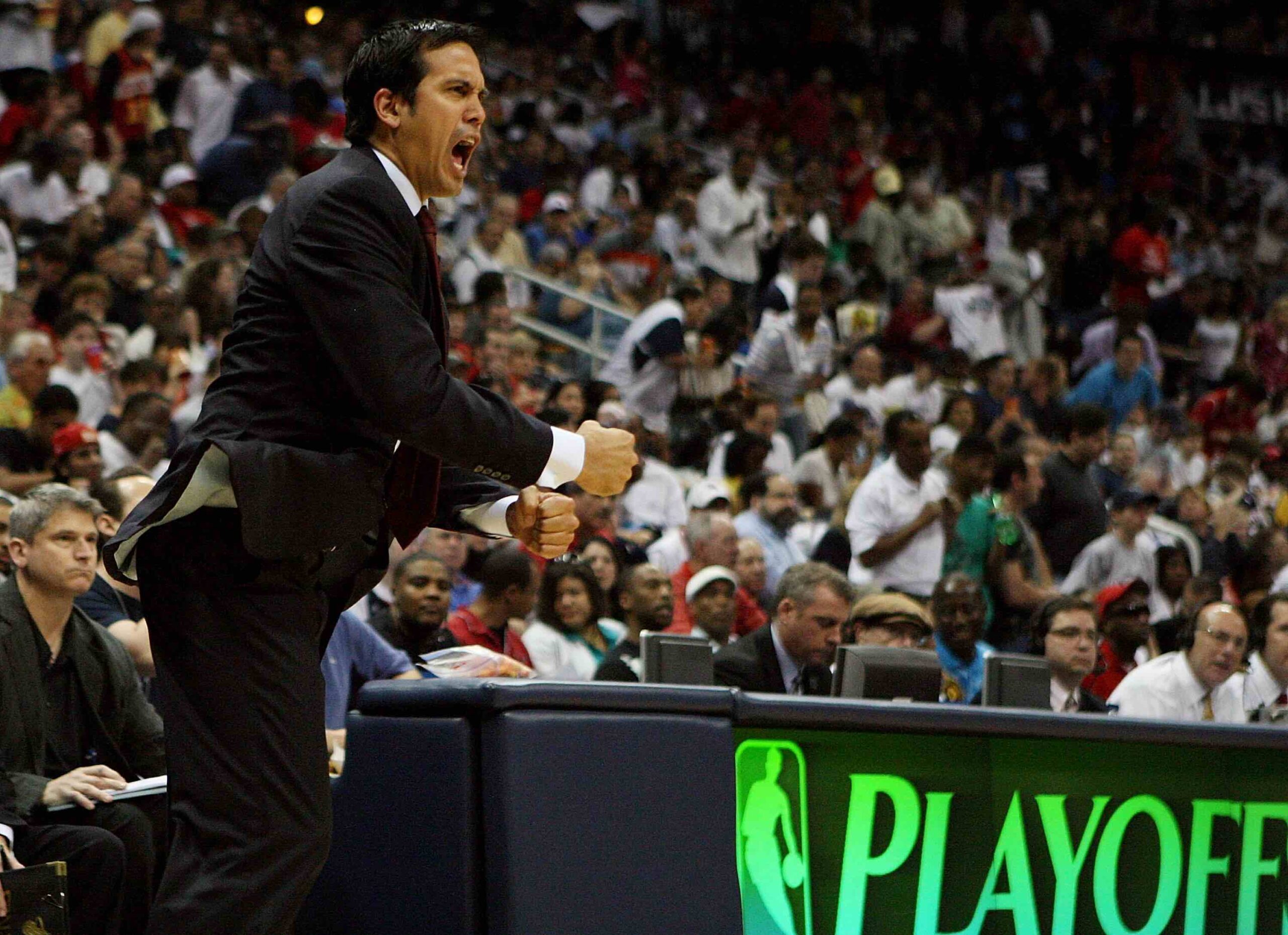
Spoelstra would go on to become the Heat’s winningest head coach in franchise history. He has led the team to 11 Playoff appearances, eight division titles, five conference championships, and two NBA championships. With his record, many regard him as one of the best coaches in the league. In 2022, he was chosen as one of the 15 Greatest Coaches in NBA History. Now, he is fulfilling a dream of working on the coaching staff of Team USA for the Basketball World Cup.
“It’s a tough profession sometimes to navigate,” he admitted. “There’s a lot of pressure to win, a lot of expectations.” But even so, he has more than proven himself capable of dealing with the struggles. And yet, when he first got the job as head coach, he revealed that he didn’t feel prepared for it.
Speaking on Hoops Paradise, a podcast about Philippine basketball, Spoelstra shared, “When I got the opportunity, I was 37 years old and I didn’t really think I was ready anyway…
“I felt like I didn’t have experience, and I also felt somewhere subconsciously that I didn’t look like your typical NBA head coach. I wasn’t an older veteran coach, I wasn’t white, you don’t really know what box to put me in, and I probably looked a lot younger than 37. I just knew, subconsciously, I didn’t look the part. And that kind of messes with you a little bit.”
As the first Asian-American head coach, and a young one at that, Erik Spoelstra did not exactly feel like he fit the ‘mold’ of your typical NBA coach, whatever that might look like. But this, perhaps, ended up working in his favor. Because even after 15 years since his appointment, two NBA championships and many records later, he still doesn’t exactly fit into any kind of mold. Instead, after struggling in his first few seasons at the helm of the Heat, he developed his own unique coaching style that has been tried and tested with and against some of the biggest names on the highest level of the sport.
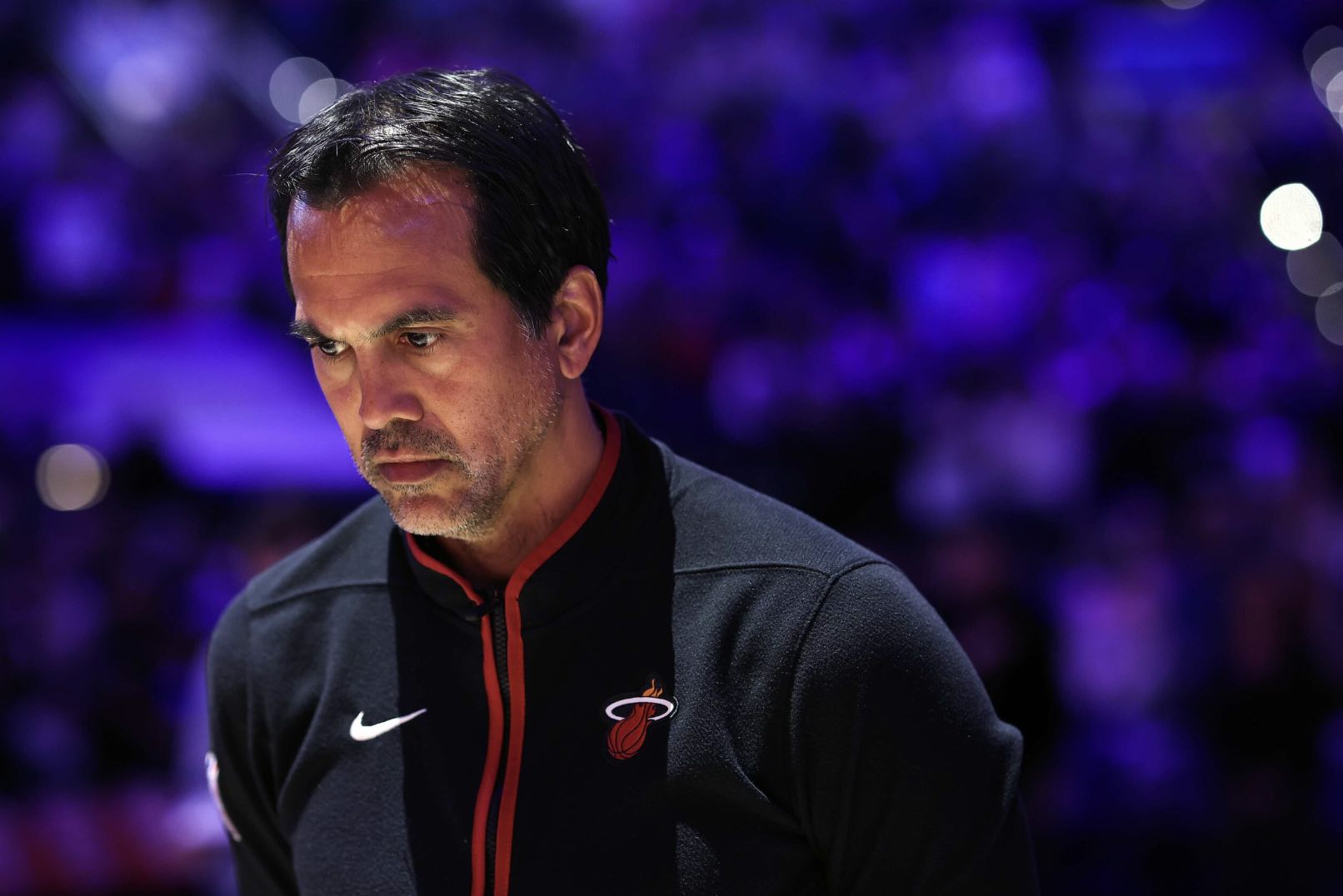
The Spo style
LeBron James, Chris Bosh, Dwyane Wade, Jimmy Butler — the list of talented players that Erik Spoelstra has coached in the last 15 years goes on and on. And every player who has gotten to play under his leadership describes his coaching style in their own way. Josh Richardson calls him a hands-on, hard worker. Kelly Olynyk tells The Athletic, “You liked him, but at the same time, you hated him, too.” Bam Adebayo says that one of Spoelstra’s best strengths is how he is able to get his players to believe in his system and believe in themselves.
Different descriptions, but they all fall under one category, which Erik Spoelstra describes perfectly when he tells me: “When you put together a team, you always want it to feel like a family. It doesn’t always happen that way, but the best teams I’ve ever been around, you feel that way.”
At 52 years old, and regarded as one of the best NBA coaches of all time, the values his mother taught him as a young boy still remain intact. It’s all about family. Listening to him speak about his upbringing, it suddenly becomes clear that this has likely become the heart of the Miami Heat’s success under his leadership — the soul of what many recognize today as Heat Culture. “The values that my mother instilled in myself and my sister are values that hopefully you see in me to this day, particularly in my profession,” Coach Spo expressed.
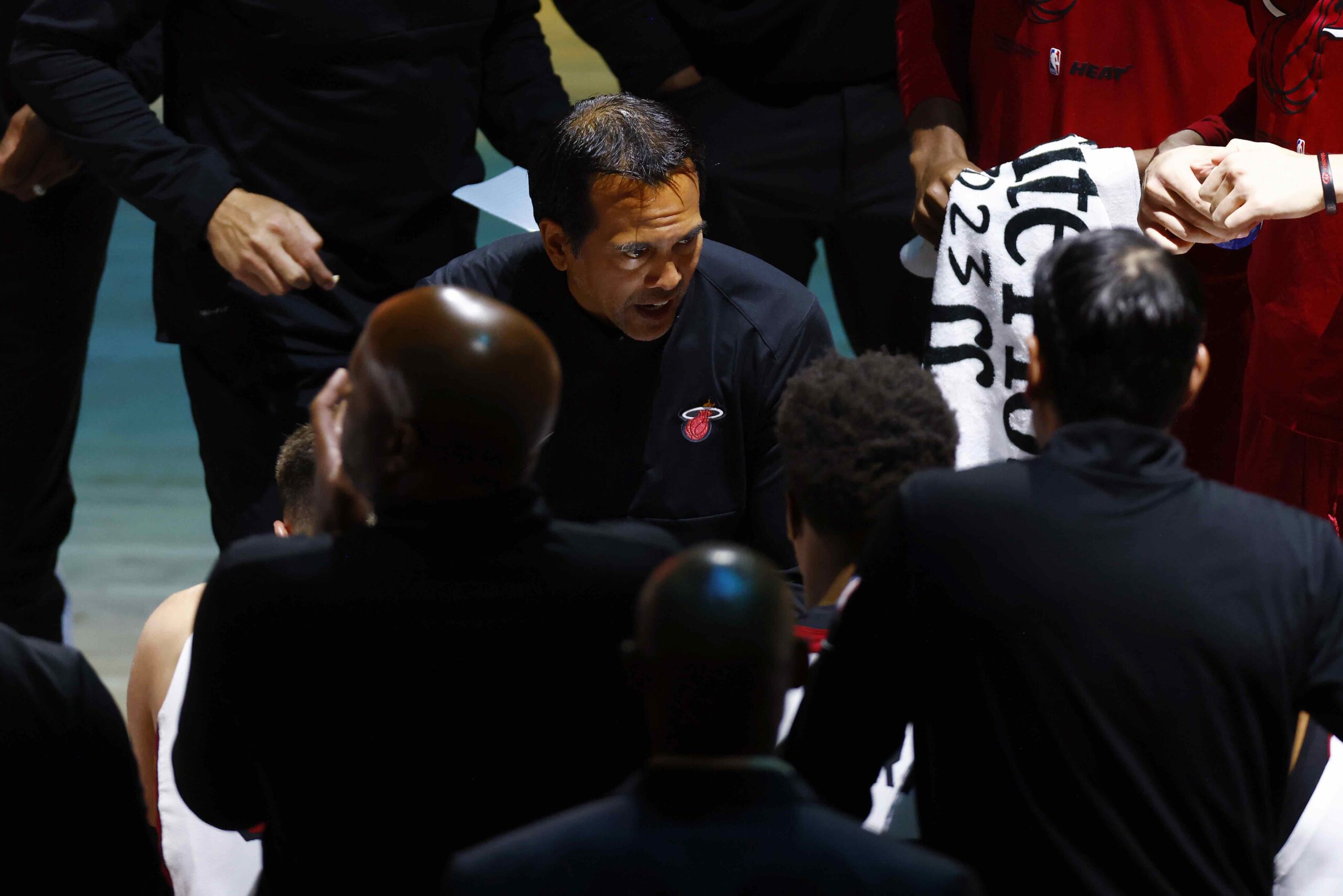
People on the outside may have their own definitions of what Heat Culture might be based on observation alone. But Max Strus, a man on the inside, has told The Athletic what their team views it as: “Everybody’s given themselves to the team. Whatever the team needs, and there’s no ego about anything right now.”
This may have been perfectly demonstrated in last season’s Eastern Conference Finals. The Miami Heat led the series against the Boston Celtics, 3-0. But somehow, the Celtics came back from the dead to force a Game 7. Heat fans were worried, pundits started writing them off after blowing a potential sweep, and many predicted the Celtics would continue their miraculous comeback run (myself included).
But something about the way the Heat played in that Game 7, on Boston’s home court, showed just how confident they were in themselves. And this ultimately came down to the culture of accountability within their team.
We know that Erik Spoelstra does not shy away from a confrontation, even in the middle of a game (we’ve seen him get into spats with Dwyane Wade and Jimmy Butler in the past). From the outside looking in, these battles may look like clashes between egos, toxic even. But in reality, it’s the opposite. With the Heat, they have a culture of being open with one another, of confronting one another, and of calling each other out, not to bring someone else down, but rather, to bring the entire team up.
When Spoelstra talks about family, he’s not talking about the picture-perfect, all-smiles-all-the-time kind. He’s talking about a real kind of family, with problems that they are willing to bring up and solve together for the betterment of the household. No sweeping things under the rug, no egos. Sacrificing personal interests for something bigger than oneself.
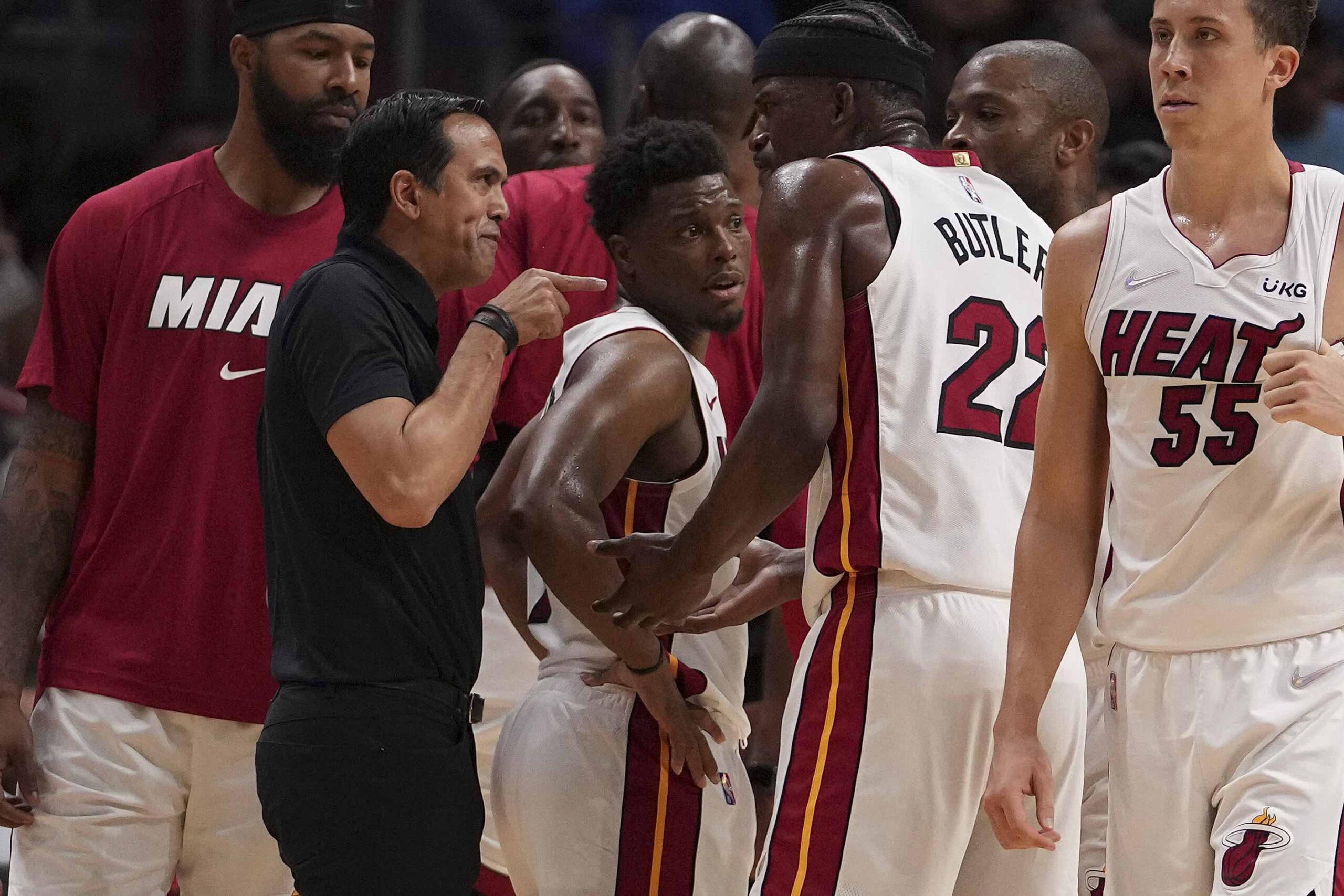
“We talk about it all the time with our teams,” Coach Spoelstra said to me. “To find gratitude in working together and trying to accomplish something big, that’s significant, and you can only accomplish it by working together. It requires sacrifice, it requires service, it requires humility, and a competitiveness that you have to have, and it’s a balance to try to incorporate all of those things.”
Bringing a sense of balance to all these moving parts isn’t always easy. In fact, it hardly ever is. But the man who worked in the Dungeon does not cower away from challenges. Spoelstra keeps his head down and willingly walks through the fire because he knows that to achieve the team’s goals, he’s going to get burned a few times along the way.
After losing three straight games in the 2023 Eastern Conference Finals series, the Heat defeated the Celtics in Game 7 to reach the NBA Finals for the sixth time under Spoelstra’s leadership.
Grounded in gratitude
In Kerry Arena, we’re approaching the end of the Q&A session with Coach Spo when the facilitator calls for one last question from the players. They are hesitant at first, but a hand slowly comes up. A young girl asks, “How do you prepare yourself mentally?”
Spoelstra ponders his response. “Not enough people talk about the mental side of it, and it’s equally as important, if not more important than the physical part of your game,” he tells the players. “I don’t operate my best if I’m not mentally right… And that doesn’t happen naturally for me. I naturally have high anxiety, I stress the little things, I tend to overthink things.”
Erik Spoelstra is a very cerebral head coach, and how he is wired has helped the Miami Heat come back from even the toughest of circumstances. But no matter how willing he is to struggle for the sake of his team’s goals, it is still as taxing as it is worthwhile.
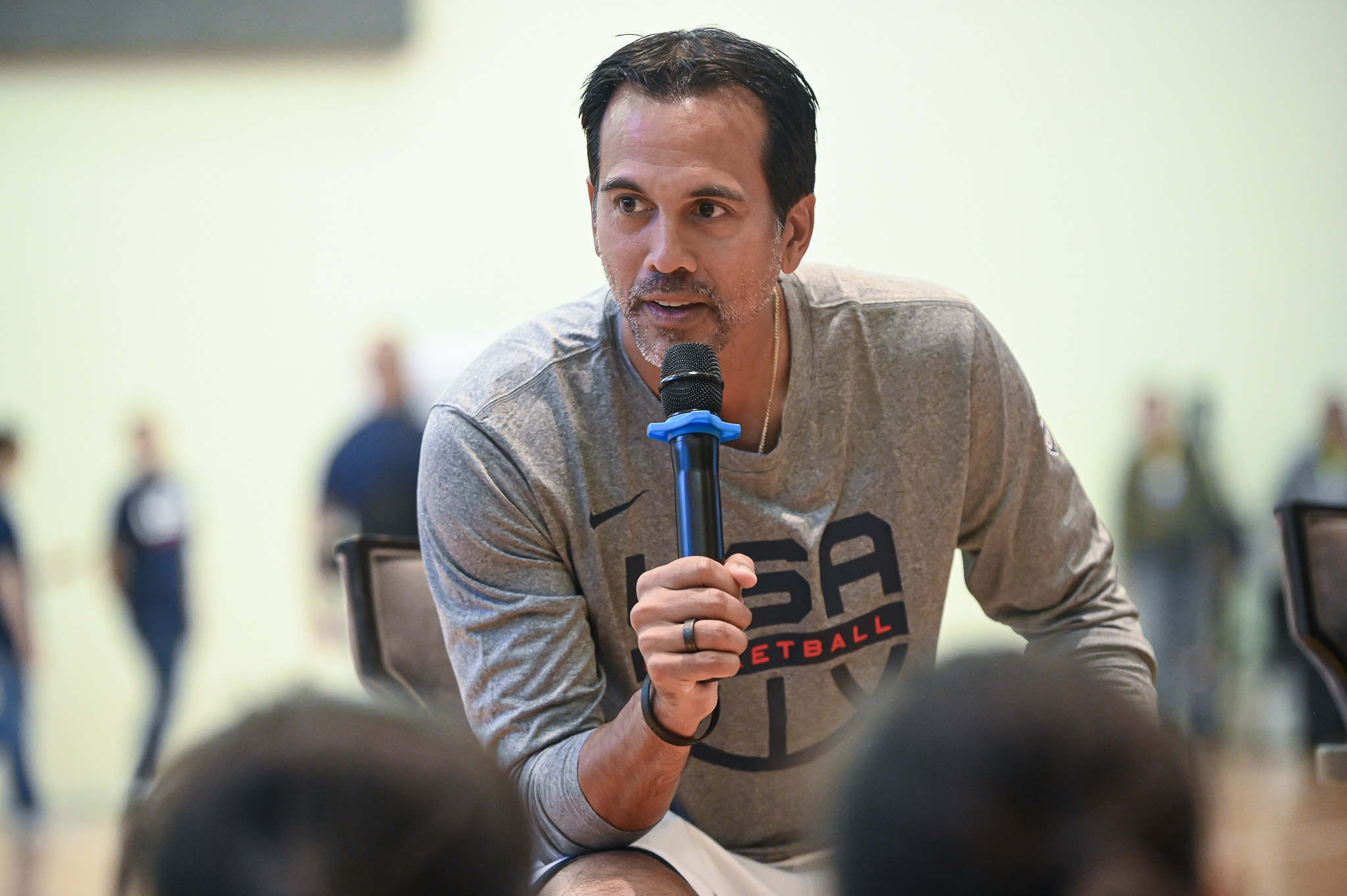
To combat the stresses of his job, he tells the young players of two things that have changed his life. The first is meditation — he tells them of the importance of carving out the time to practice some form of meditation to help with focus, even recommending some applications they can use to start — and the second, which he considers the biggest tool in his arsenal, is his gratitude practice.
“I do a gratitude practice on a journal every single night. Every night,” he emphasizes. “And if I don’t do it, I feel it. I just want to remind myself of three things every day that I’m grateful for and I write it down. It could be related to basketball, it could be related to family, it could be related to anything. I think, so often, there’s so much pressure on all of us to think about all the things that you want or are expecting, and you’re not spending enough time reflecting on what you’re truly grateful for.”
Admittedly, this isn’t something I was expecting from someone who can be so tough during games that he slams his clipboard on the court to make a point, and so I smile as I see the players take in his advice, wondering what his journal entries look like. But later in the day, he gave me an idea.
“I feel very grateful to be able to work in this profession of basketball and I’ve been able to carve out a life because of that so I’m always really grateful for those values that my mother instilled early on,” he tells me. “As I reflect back on it, I hope that’s what our teams reflect — some of these values.”
In the Philippines, we have this saying: utang na loob. I won’t be the first Filipino to acknowledge that this phrase sometimes comes with negative connotations, but at the heart of it, it simply means, ‘a debt of gratitude.’
As Spoelstra looks back on his career, you can feel the sense of gratitude he has for all that he has been through to reach this point. When his career was just taking off, he used to think that he would maybe become a high school or college coach at best, not at all expecting the job as an NBA head coach. Now, he is fulfilling his dream of being on the Team USA coaching staff. Everything that made Coach Spo feel unlike your ‘typical’ NBA head coach is everything that made him the beloved figure that he is, among players and fans alike.
But, he’s admitted in the past that he does have one regret: not playing in the PBA.
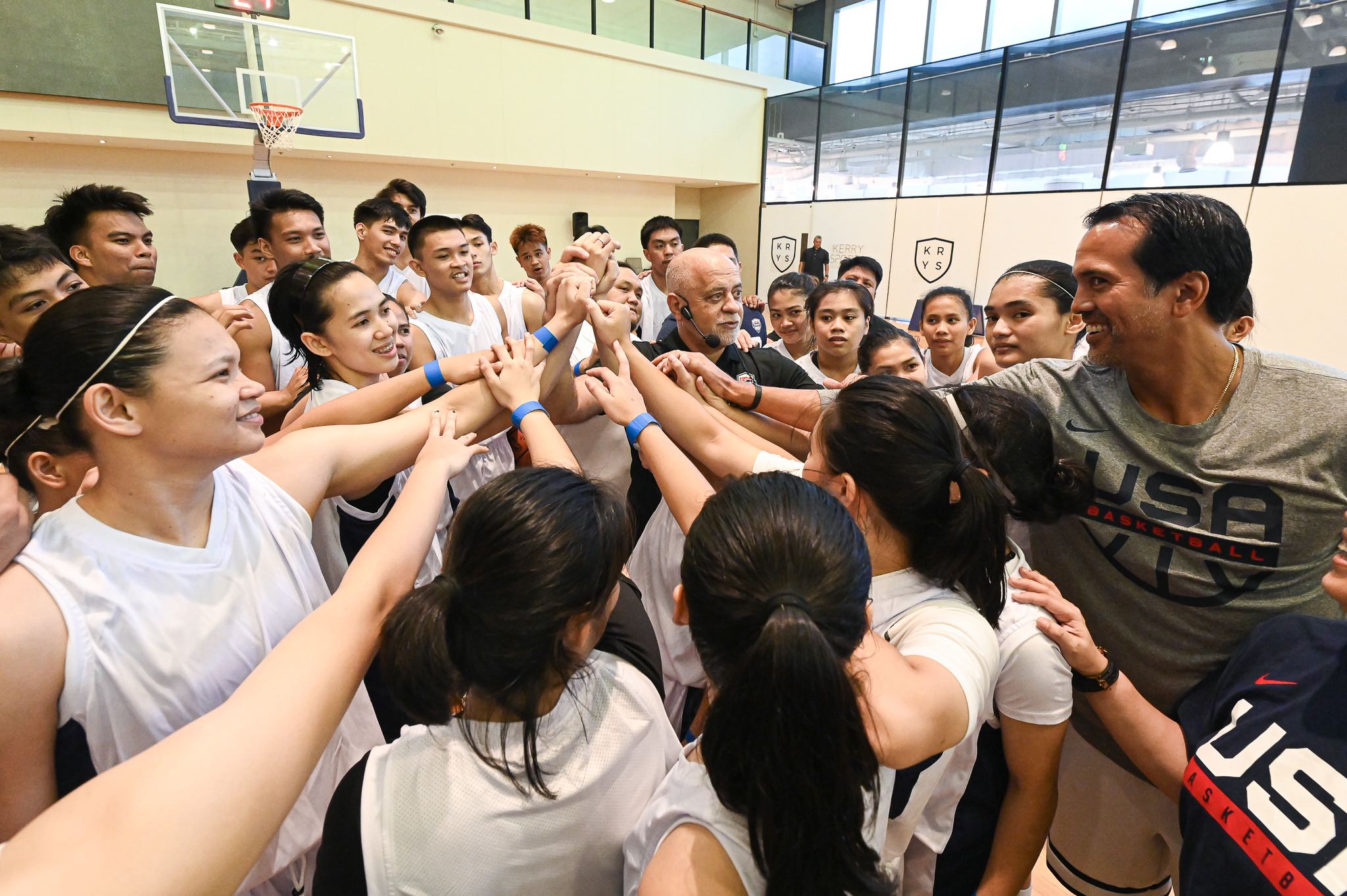
Upon discovering that Spoelstra planned on becoming a PBA player, I reveled at the thought. I’m sure I’m not the only one. I wondered what it might have been like. Would he have changed the game? Would the PBA be different than it is today? Would he have gone on to coach our national team?
But even as I fantasize about worlds in which all these could have been true, I’m grateful that Erik Spoelstra did not come to play in the Philippines and that he instead took the path to Miami. I’m grateful that whenever I watch the NBA, I see someone on the biggest level of the sport who looks like me; who looks like my younger cousin who hopes to be like him one day; who looks like all these young Filipino players with dreams. I’m grateful that we have someone with whom we resonate, who is not just a coach, but someone who is more than that — someone who shows us that what makes us different can be what gives us our edge. He is a man, an icon, a role model who, just as often as he breaks records and wins titles, instills values within his players that transcend the court — the same values our parents taught us.
When Erik Spoelstra first got the opportunity to lead the Miami Heat, he did not really think about the fact that he was the first Asian-American head coach. After all, he was more focused on the job he had to do and the large shoes he had to fill. But over time, as he accepted the role of role model, he says, “It became a source of pride.
“If that’s opened some eyes and doors for somebody else who has a dream, maybe Asian or maybe a different ethnicity, or even a female, you don’t have to look and be the stereotype. I think that helped me find a deeper sense of purpose for myself in this coaching profession, where it wasn’t just about doing the job and trying to get wins…
“If we can be partial contributors to dreammakers, I’m all for it.”
Text ANNIKA CANIZA
Cover Image CHRIS TROTMAN / GETTY IMAGES NORTH AMERICA / GETTY IMAGES via AFP
Cover Layout KARLOTA TUAZON
Banner Image MADDIE MEYER / GETTY IMAGES NORTH AMERICA / GETTY IMAGES via AFP
Special Thanks NBA PHILIPPINES and M2.0 COMMUNICATIONS INC.
Related Stories:
How Erik Spoelstra Inspires Young Filipino Basketball Players
On the World Stage: Gilas Pilipinas and the Philippines’ Historic Hosting of the 2023 FIBA World Cup
EJ Obiena: On Wearing the Flag and the Olympic Dream
